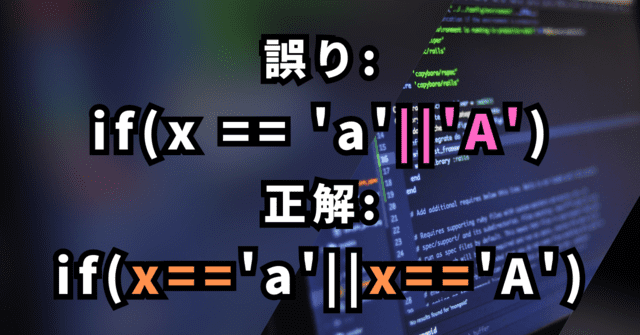warning: use of logical ‘||’ with constant operand
警告:論理演算子||に定数を使った
[-Wconstant-logical-operand]
■’b’を入力すると何と表示されますか?
#include <stdio.h>
int main(void){
int x = getchar();//'b'を入力してね
if(x == 'a' || 'A'){
printf("A=%c",x);
} else
if(x == 'b' || 'B'){
printf("B=%c",x);
} else {
printf("C=%c",x);
}
}
解答は自分でコンパイル&実行してね。
■if(x == 1 || 2)
int f(int x) {
if(x == 1 || 2)
return 1;
return 0;
}
論理演算子に定数を使用するのは間違いの可能性が高いです。
if(x == 1 || 2){ //原作は次のどちらかの誤り
if(x == 1 || x==2){
if(x == (1 |2)){
■case 1||2:
(warning): Found suspicious case label in switch(). Operator ‘||’ probably doesn’t work as intended.
警告:怪しいcaseラベル。論理演算子は期待した動きをしない。[(warning)suspiciousCase]
int f(int x) {
switch(x){
case 0:
case 1||2://ダメ
case 4:
return 1;
}
return 0;
}
case 1||2は(論理演算子)
case 1|2か(ビット演算子)
case 1:
case 2:の誤りと思われます。


